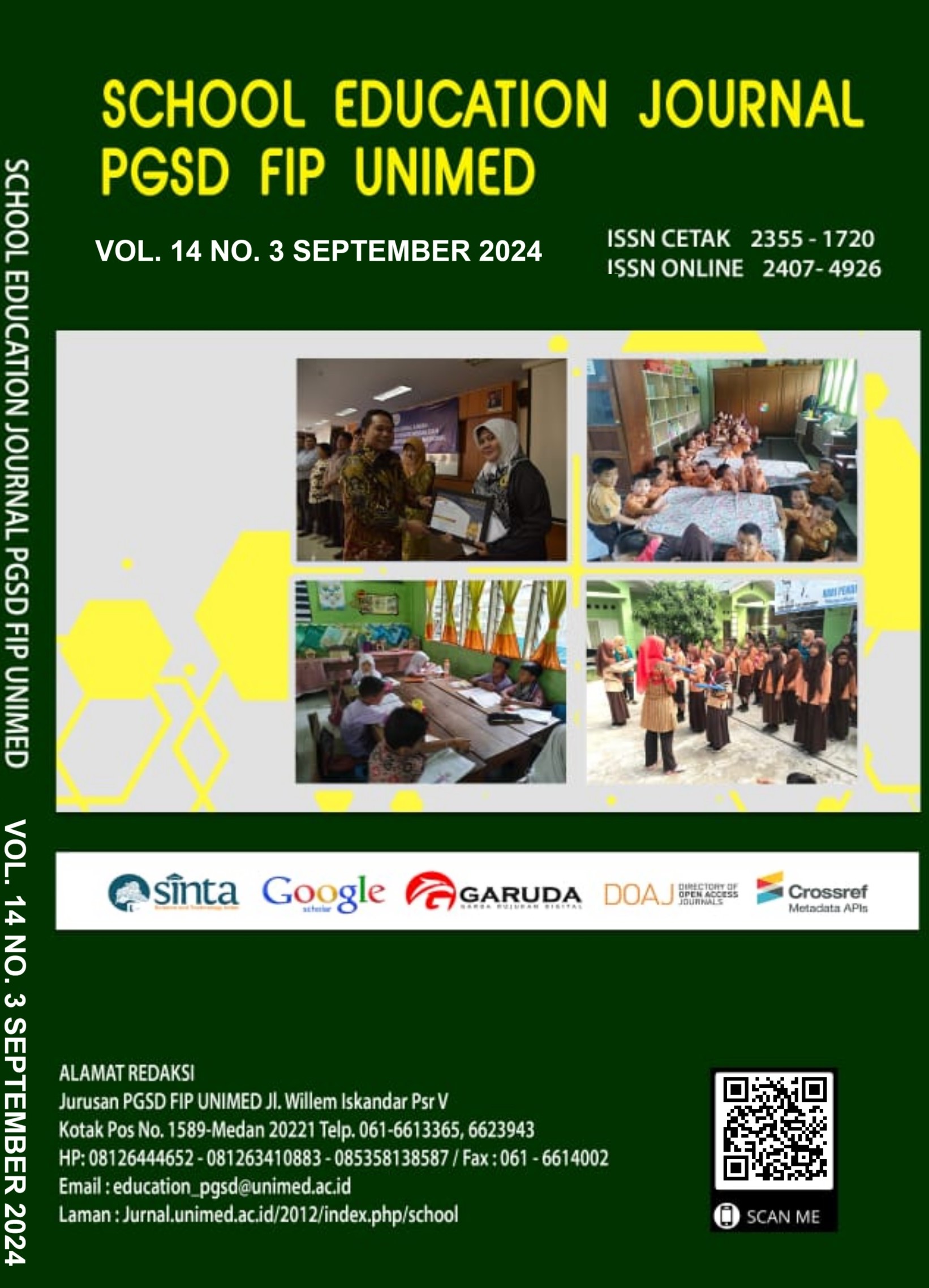PENGARUH MODEL PEMBELAJARAN AIR (AUDITORY, INTELLECTUALLY, REPETITION) TERHADAP PEMAHAMAN KONVERSI SATUAN PANJANG SISWA SEKOLAH DASAR (SD)
DOI:
https://doi.org/10.24114/sejpgsd.v14i3%20SEP.60663Keywords:
AIR learning model (Auditory, Intelectually, Repetition), student comprehension, mathematicsAbstract
Mathematics learning in unit length conversion is still a problem that must be solved at SDN Ganeas I and II. The students still can't understand the concept of unit length conversion correctly. Therefore, in the learning activities, need a new innovations learning models. This research purpose to determine AIR (Auditory, Intelectually, Repetition) learning model on the concept of length unit conversion for students grade IV of elementary school.The research method used is a quasi-experiment with a non-equivalent control group research design. Data collection with observation and tests.The tests used are pretest and posttest, the sample was grade IV students SDN Ganeas II as the experimental class and grade IV students of SDN Ganeas I as the control class.Data processing techniques using normality tests, homogenenity, t-tests, Mann withney tests, normalized gain tests, with the help of SPSS 26.The results of the study, with using the Mann-Whitney test obtained a p-value of 0.000<0.005,then H0 is rejected and H1 is accepted, so it is concluded that there is an improvement in students' abilities with the AIR (Auditory, Intelectually, Repetition) learning model.References
Ampera, D., Rambe, N. R., Ihwani, M., & Erlando, R. (2024). Kemampuan Guru Mengelola Kelas Terhadap Proses Pembelajaran. 14(2).
Apriyanti, H. (2017). Pemahaman Guru Pendidikan Anak Usia Dini Terhadap Perencanaan Pembelajaran Tematik. Jurnal Obsesi: Jurnal Pendidikan Anak Usia Dini, 1(2), 111“117.
Asih, N. P. A. G., & Ganing, N. N. (2020). Model Auditory, Intellectually, Repetition (Air) Berbantuan Media Audio Visual Berpengaruh Terhadap Peningkatan Kompetensi Pengetahuan Ipa. Mimbar Ilmu, 25(3), 411“421.
Huda, M. (2013). Model-Model Pengajaran Dan Pembelajaran: Isu-Isu Metodis Dan Paradigmatis. Bandung: Karya Cipta.
Maxwell, M. L., Abrams, J., Zungu, T., & Mosavel, M. (2016). Conducting Community-Engaged Qualitative Research In South Africa: Memoirs Of Intersectional Identities Abroad. Qualitative Research, 16(1), 95“110.
Maylitha, E., Parameswara, M. C., Iskandar, M. F., Nurdiansyah, M. F., Hikmah, S. N., & Prihantini, P. (2023). Peran Keterampilan Mengelola Kelas Dalam Meningkatkan Minat Belajar Siswa. Journal On Education, 5(2), 2184“2194.
Sanjaya, W. (2015). Perencanaan Dan Desain Sistem Pembelajaran. Bogor: Kencana.
Shoimin, A. (2019). 68 Model Pembelajaran Inovatif Dalam Kurikulum 2013. Yogyakarta: Mm.
Tias, A. A. W., & Wutsqa, D. U. (2015). Analisis Kesulitan Siswa Sma Dalam Pemecahan Masalah Matematika Kelas Xii Ipa Di Kota Yogyakarta. Jurnal Riset Pendidikan Matematika, 2(1), 28“39.
Viola, M. F., Sarifah, I., & Yudha, C. B. (2024). Pengaruh Implementasi Wordwall Quiz Terhadap Hasil Belajar Siswa Dalam Mata Pelajaran Bahasa Indonesia. 14(2).
Widyantari, F. P. (2016). Analisis Kesalahan Siswa Berdasarkan Tahapan Kastolan Dalam Menyelesaikan Soal Cerita Matematika Materi Lingkaran Kelas VIII SMP Negeri 1 Salatiga. Bandung: Karya Cipta.
Zulmaulida, R., Saputra, E., Munir, M., Zanthy, L. S., Wahnyuni, M., Irham, M., & Akmal, N. (2021). Problematika pembelajaran matematika. Yayasan Penerbit Muhammad Zaini.
Downloads
Published
Issue
Section
License
Authors whose manuscripts are approved are approved as follows:
The publication rights for all journal manuscript materials published/published on the SEJ (School Education Journal) E-Journal site are held by the editorial board with the author's knowledge (moral rights remain with the manuscript authors).
The formal legal requirements for accessing this electronic digital journal article are subject to the terms of the Creative Commons Attribution-ShareAlike (CC BY) license, which means that E-Journal SEJ (School Education Journal) has the right to store, transfer media/format, manage in the form of a database, maintain, and publish articles without asking permission from the author as long as the author's name remains as the copyright owner.
Manuscripts published/published electronically are open access for educational, research, and library purposes.

